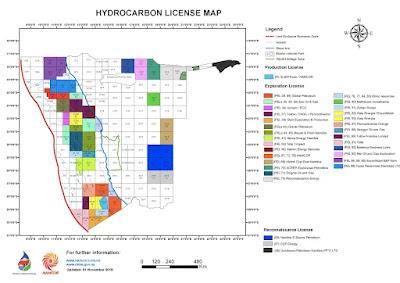
Nabirm and Hydrocarbon License Map in West Africa
Donald V. Watkins is best known, especially in his native state of Alabama, as an attorney. After that, Watkins is best known on his native soil as a banker. But Watkins might wind up leaving his most significant mark on the fields of clean energy/biofuels and international business. How does such a transition happen in three such disparate fields.
Watkins traces the steps on that journey in a post titled "The Joy of Climbing Mountains in International Business." The drive to achieve came from a number of sources, especially his family while he was growing up in Montgomery, Alabama, which was segregated until Rosa Parks sparked the Montgomery Bus Boycott, with a young pastor named Martin Luther King being chosen as president of the organization formed to lead the protest.
Watkins went on to the University of Alabama School of Law, where he was part of the second group of students to desegregate the law school. A janitor at the law school, Ramus Rhodes, receives credit for turning Watkins into a courtroom warrior. Writes Watkins of his legal mentor:
Most people don’t get it. They think I should be slowing down in my work-related activities. Wrong!
A lot of people know I had a great track record as a litigation attorney. I hold the national record for winning the most felony counts (85) in a single defendant case (U.S. v. Richard Scrushy). I also hold the national record for winning 155 straight courtroom victories.
These records in law will likely never be broken in my lifetime.
The person who taught me the art of war in law was a janitor at the University of Alabama’s law school named Mr. Ramus Rhodes. Every courtroom victory in my career was dedicated to Mr. Rhodes, with a smile on my face.
Watkins' drive to achieve eventually expanded beyond the courtroom. He does not attach a theme to the mindset that led him to new worlds, but we will call it "Lead With Your Head, But Listen to Your Heart." Both, it turns out, are important, and Watkins' career has been a testimony to that. He writes:
I enjoyed dominating my opponents in the “gladiator pit,” but my passion has always been in the international business arena.
Today, two companies provided me with the platforms to pursue my passion in international business – Nabirm Energy Services (Pty) Ltd. and Masada Resource Group, LLC.
Nabirm is based in Windhoek, Namibia (West Africa). In July 2012, Nabirm was awarded a petroleum-exploration license by the Namibian Ministry of Mines and Energy. In 2016, the company announced the discovery of a massive reservoir of unrisked oil and natural gas within its licensed territory offshore. The company is proceeding with the geotechnical work program necessary for the commercial extraction of these natural resources.
Masada is a waste-to-energy technology company. Based in California today, the company is presently pursuing the development of a planned waste-to-ethanol facility in the Durbin/Mandeni Region of South Africa.
The Nabirm and Masada project-development experiences are akin to mountain-climbing. There are no short-cuts, and these projects require tremendous focus, detailed planning, world-class partners, flawless execution, and a fair amount of patience.
I am blessed to work with the best and brightest minds in the U.S. and around the globe on both projects.
Watkins spells out what he means by the value of patience in the clean-energy sector:
It took several years to accomplish, but I have finally freed myself of the naysayers, negative thinkers, and obstructionists who worked hard to slow the forward progress of both companies.
Our business-development teams work each day to bring our projects to life. The dedication, focus, and energy of my team members never cease to amaze me.
In mountain climbing, we focus on how close we are to the summit, not how far we have come from the base of the mountain.
I learned this valuable lesson from my teachers at Alabama State College Laboratory High School.They taught us the art of mountain-climbing in life and in business. Today, I climb these two mountains for them.
I want to become a full participant in the global stream of commerce. I enjoy building competitive international businesses, with their never-ending challenges, ups and downs, and occasional successes.
Finally, it is also a wonderful experience whenever my business-development teams get a chance to shatter the negative racial stereotypes held by many Americans (both Black and White). We have done this -- against all odds -- in the fields of law, banking, and now, energy.
